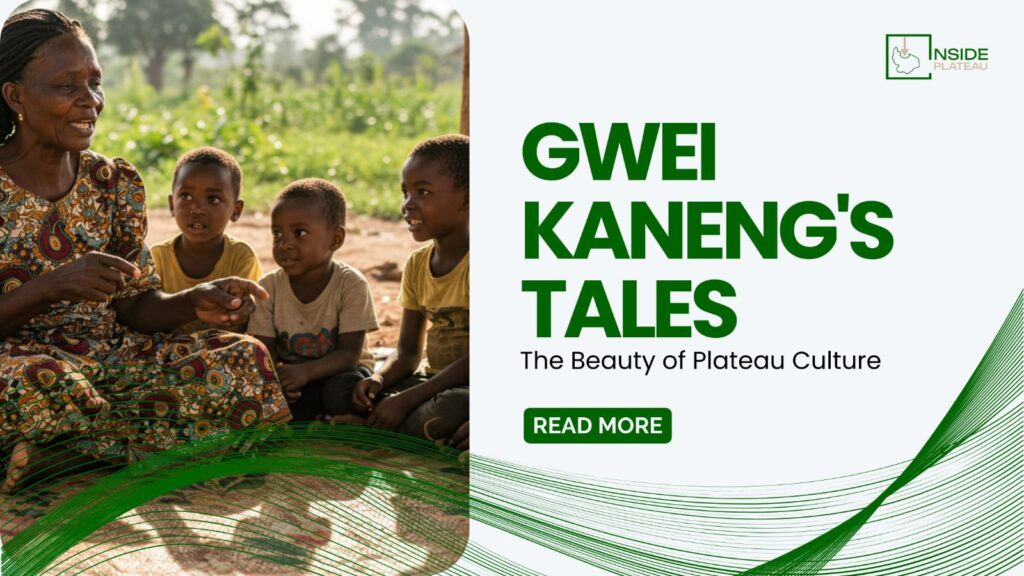
The evening wind swept softly through the Rayfield compound, carrying with it the scent of burning firewood and fresh leaves. The children gathered as usual under the neem tree, their small stools forming a circle. Tonight, they waited eagerly for Gwei Kaneng, their hearts already tuned to her voice.
But before she arrived, an argument broke out.
“My tribe is the oldest!” Nenpo declared, thumping his chest proudly.
“No!” Davou countered quickly, “the Berom were here before all of you.”
Plangnan shook her head, “But the Maghavul have the best food. I believe everyone knows that.”
Nanjul countered, “That’s a lie, the Tarok food is the sweetest! Have you tasted Amora?”
“Maghavul is the best, that’s why Governor Caleb Mutfwang is Maghavul” Plangnan fired back and all the children looked at her surprised at her point.
The debate grew louder but Timbyen, as usual, sat quietly with folded hands, her eyes lowered.
The children were still arguing when Gwei Kaneng walked in, she was holding a bowl filled with berries. She paused, and watched their faces. “Oh, my children,” she said in a calm tone. “Why waste much energy, arguing over who is greater? Can’t you see the gift you have? You all live in one compound, you eat food of different Plateau tribes from your various kitchens, you also have the opportunity to hear many languages, to learn many, and lots more. This should be a blessing. Not a battle.”
The children lowered their eyes, some burying their faces in their hands, ashamed. Gwei smiled warmly and she gently sat on her stool, then performed her normal ritual of clearing her throat, then began:
“When I was much younger and stronger, I was able to travel all across Plateau State. I attended all traditional festivals, I tasted various local delicacies, I danced with strangers who later became family. Let me tell you about the traditional festival of my own people first. The Nzem Berom”
Nzem Berom
“Since my early years, I’ve been attending the Nzem Berom, the rich festival of the Berom people. It’s mostly observed every April, just before the farming season. Ah, Nzem Berom is always very colourful! You’ll see the men dressed in leopard skins, while the women are adorned in beautiful beads that shone and glitter like the sun, the drummers beat skin drums and they dance until the ground itself is shaken.
What I love most is the fierce hunters’ dance and also the warriors display in their full war-lords attire. The maidens’ dance was also graceful. The Gbong Gwom Jos, our royal father, sits in his complete royal robe, as people bring gifts of food items, drinks, and cultural crafts. Visitors were welcomed with plates of Gote. Gote is mashed corn grain prepared like a vegetable stew. Visitors and hosts all ate until my stomach begged for mercy, they always urged people to keep eating, ‘Eat more’ they’ll say. ‘No visitor ever leaves a Berom home hungry.”
The Children were all attentive, listening to Gwei with keen interest. Nenpo then asked, “Gwei have you ever attended the Ngas festival? Please tell us about it”.
Pusdung
“A few years ago, I travelled to Pankshin to witness the Pusdung, the rich traditional festival of the Ngas people. The festival is often observed in April too. For three days, the town came alive. Drums, harps, local flutes, and sounds of horns filled the air. Several dance groups, some in red and black cloth, others in animal skins, others in green and white all moved in lines, they stamped their feet in rhythm and unison, and their voices sang songs that spoke of history and hope.
Ah, I loved the food! The Ngas people welcomed us the visitors with bowls of hot tuwon acha , with puklenden (a traditional soup of the Ngas people, they gave us Olive Oil to dip our meat (Nam Ass) and it was so delicious that I had to buy a bottle of Olive Oil before leaving. Strangers became friends at the festival, for in Pankshin, food is never eaten alone. A typical Ngas person is always unhappy if one sees him dinning and doesn’t join the table. Their kindness always reminds me of our popular Plateau saying: ‘He who shares his meal never dines alone’
The Children were all listening to Gwei attentively. Gwei smiled at Timbyen and her brother Nanjul. “I know Nanjul and Timbyen will love to hear about the Tarok festival.” They both smiled and chorused “Yes Gwei.” Gwei Kaneng shared the berries in the bowl among the children. She cleared her throat once more and continued.
Ilum O’Tarok
“ I once went to Langtang to witness Ilum O’Tarok, the traditional festival of the Tarok people. The Langtan township stadium was filled with lots of people wearing bright wrappers and beautiful feathered caps. Their traditional ruler, the Ponzhi Tarok, was ushered in with dignity.
The Tarok people danced with pride, sang songs of bravery of their ancestors and of love and unity. Masquerades danced with the crowd, with their steps symbolizing that of old spirits. During the festival, I was served Amora. Amora is a soft porridge that is made from grounded cocoyam and vegetables seasoned with moringa leaves. My host who was my mate back then in school insisted, ‘Eat, Kaneng! In Langtan, no visitor goes to bed on an empty stomach.’ The food warmed my body, but their hospitality warmed my heart even more. The Tarok people love each other so much”
Bit Goemai
“My journey once took me to Shendam where I attended the Bit Goemai Festival. The Gamai people came out in thousands. I watched as masquerades jumped into the air, dressed in glaring colours, their movements pure poetry. The drums were thunderous, the flutes were melodious, and the songs sang carried the weight of past centuries.
Before the dance commenced, the women spread mats and brought food including: pounded yam, Amora, Soema(Risga), fish pepper soups, pork meat, and rice cooked with fish sauce. I was a stranger, but I was treated like family. An old woman pressed food into my hands, smiling, ‘My dear, no guest should ever sit idle while others eat.’ I ate with them, my soul danced along with their drums.”
Plangnan and Nandom were muttering something and it caught Gwei Kaneng’s attention. “I know why both of you are murmuring. I haven’t spoken about the Maghavul traditional festival. I saved it for last.”
Puuskaat
“I once attended the Puuskat Festival. It is the annual cultural event celebrated by the Mwaghavul people in Plateau State every April. Considered the “mother of all festivals”, the Puuskat showcases the rich cultural heritage of the Mwaghavul nation.”
” I’ll highlight some aspects of the Puuskat Festival:
– Cultural displays: The event features beautiful and colorful cultural displays.
Traditional dances: Traditional dancers dressed in rich Maghavul outfits display the Mwaghavul people’s rich cultural heritage.
Reunion and unity: The Puuskaat festival serves as a very important occasion for reunion, unity, and promoting peaceful coexistence.
Food: I was served shol (a maize and beans combo) and pululuk and acha. Their food is unique and tastes great. “
The Lesson
Gwei Kaneng paused, and looked at each of the children. Their eyes were wide, their mouths slightly open.
“So you see, my children,” she said, her voice gentle but firm, “these festivals are more than just entertainment. They help us remember who we are. They help us pass our stories to the younger generation. They help us show hospitality to strangers and friends alike. The food, dance and songs are the roots of our Plateau.”
Davou raised his hand shyly. “Gwei, I want to witness the Nzem Berom war dance one day.”
Nanjul clapped his hands. “And I will like to eat Nam Ass with Olive Oil at Pusdung!”
Nenpo grinned. “I would also like to taste Amora in Langtang.”
Nandom whispered, “And I want to see a masquerade”
Timbyen, who had been quiet all evening, finally smiled. “Gwei, I am happy we are different. It means we have more to share and from each other”
Gwei’s eyes brightened. “Yes, my dear. Diversity is not for quarrels and misunderstanding. It is for celebration and growth. Remember, in Plateau State, every drumbeat, every dance , every song, every meal, every smile says the same thing: You are welcome.”
The night deepened, but the compound shone with the children’s laughter. Their faces lit brighter than ever. The children no longer argued, they dreamed.
